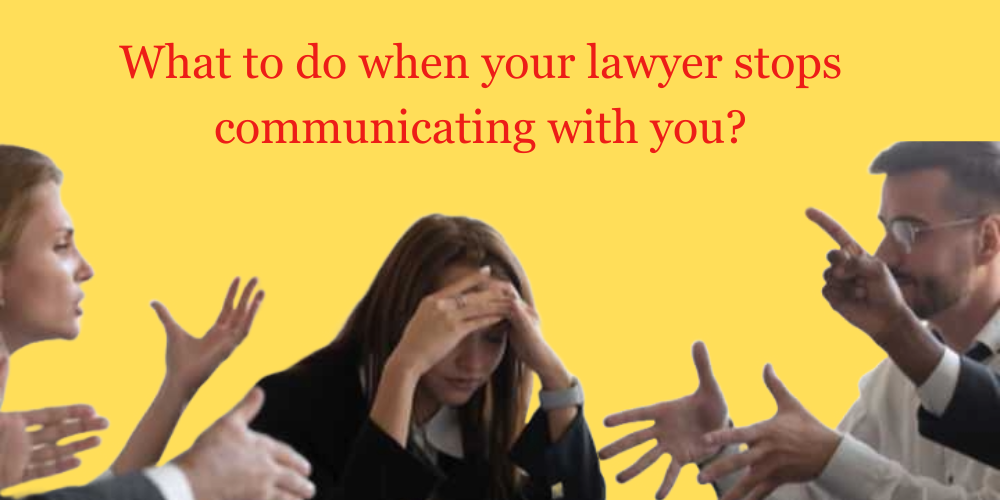Dealing with legal matters can be stressful, and having a lawyer by your side is supposed to bring relief. But what if your lawyer stops communicating with you? or your attorney sells you out, It can be frustrating and confusing. Don’t worry; we’ve got you covered with practical steps to take when faced with this situation.
Importance of Communication between Client and Lawyer
Communication is the key to any successful relationship, including the one you have with your lawyer. When you hire a lawyer, you’re essentially forming a partnership to work towards a common goal – resolving your legal issue.
For this partnership to work, open and regular communication is vital. Your lawyer needs to understand your situation fully, and you need to know what they’re doing on your behalf. It serves as the foundation for a successful lawyer-client relationship and has far-reaching implications for the outcome of the case.
- Understanding the Legal Process
- Building Trust and Confidence
- Managing Expectations
- Gathering Information
- Timely Responses
- Reducing Anxiety
- Adapting Strategies
- Fostering Collaboration
Possible Reasons for My Lawyer Is Not Working For Me
- Busy Schedules
Lawyers often have a lot on their plates, handling multiple cases simultaneously. This workload can sometimes lead to delays in communication.
- Miscommunication
Sometimes, miscommunication can happen on both ends. Your lawyer might assume you’re already aware of certain updates or might not have received your messages.
- Technical Issues
In today’s digital age, emails can get lost in spam folders, and phone messages might not reach their intended recipients due to technical glitches.
- Legal Jargon
Lawyers are well-versed in legal language, but you might not be. If they’re using complex terms without explaining them, you might feel left in the dark.
10 Steps to Take When Your Attorney Stops Communicating With You
When your lawyer not responding, it can be concerning and frustrating. Here are ten steps to navigate this situation:
1: Stay Calm and Patient
- Take a Breath
It’s easy to panic, but staying calm helps you think clearly.
- Give Time
Sometimes, lawyers get busy. Give them a little time before taking action.
2: Polite Reminders
- Send an Email
A gentle email asking for an update might get a response.
- Be Respectful
Keep your tone polite, as they might have a genuine reason for the silence.
3: Escalate the Communication
- Call the Office
If emails don’t work, a phone call can break the ice.
- Speak Politely
Express your concerns without being confrontational.
4: Seek Alternatives
- Contact the Law Firm
Reach out to the law firm’s front desk for assistance.
- Ask for a Backup
Inquire if another lawyer can provide interim assistance.
5: Review Your Agreement
- Check the Contract
Revisit your agreement to see if there’s a communication policy.
- Know Your Rights
Understand your rights as a client and what’s expected.
6: Assess the Situation
- Consider the Timing
If your lawyer is in court, they might be temporarily unreachable.
- Evaluate Urgency
Is immediate communication crucial, or can it wait a bit?
7: Stay Informed
- Research Yourself
Read up on your case to stay informed while waiting.
- Be Patient
Legal processes can be slow; remember patience is key.
8: Seek a Second Opinion
- Consult another Lawyer
Getting a fresh perspective might be helpful.
- Don’t Rush
Take your time in finding a suitable alternative.
9: Contact the Bar Association
- Legal Oversight
If communication remains broken, consider involving legal authorities.
- File a Complaint
The state bar can guide you on filing a complaint against your lawyer.
10: Protect Your Interests
- Document Everything
Keep records of all communication attempts.
- Prepare for Change
Be ready to switch lawyers if necessary.
Is it normal to have no response from your attorney?
It’s not normal if your lawyer isn’t communicating with you. Lawyers should talk to their clients that are part of their job. In a well-mannered law firm, there are rules that state lawyers must inform their clients what’s happening in their cases and answer their questions.
These guidelines emphasize those lawyers keep clients informed and reply to their messages quickly. They should also explain things in a way that helps clients understand, so they can make good choices about their case. If your lawyer isn’t talking to you, they might not be doing what they’re supposed to do.
FAQs
Q: Can I change my lawyer midway?
Yes, you have the option to request a new lawyer from the law firm or consult a different attorney if you’re unsatisfied.
Q: Is lack of communication common in legal cases?
While occasional lapses can happen, a consistent lack of communication isn’t typical. Open dialogue is essential for legal proceedings.
Q: What if lack of communication harms my case?
If you believe your lawyer’s lack of communication caused harm, consult another attorney to explore potential legal malpractice claims.
Conclusion
Communication is the backbone of any effective lawyer-client relationship. While occasional lapses can occur, consistent and transparent communication is crucial for navigating legal matters effectively.
If you find yourself in a situation where your lawyer isn’t communicating with you, take proactive steps to address the issue. Remember, you have the right to be informed about your case’s progress and to have your questions and concerns addressed promptly.
